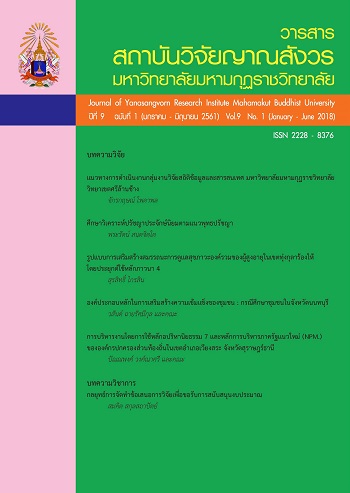FACTORS EFFECTING ON STUDENT’S SELF-DISCIPLINE OF BACHELOR OF DEGREE AT RAMKHAMHAENG UNIVERSITY
Main Article Content
Abstract
This objective of the research article were to (1) the relationship between democratic upbringing, parents’ learning support, student-teacher relations, instructional atmosphere, upbringing and self-discipline of bachelor’s degree students at Ramkhamhaeng University and (2) predicting factors of self-discipline among bachelor’s degree students at Ramkhamhaeng University. The sample group of this research was 393 bachelor’s degree students of year 1-4. The data were collected through questionnaires self-discipline measurement with a reliability of .837, and democratic upbringing with a reliability of .844, parents’ learning support with a reliability of .940, student-teacher relations with a reliability of .880, and instructional atmosphere with a reliability of .785. The statistics used to analyze data consisted of means, standard deviation, Pearson’s correlation coefficient, and multiple regression analysis. The results were concluded as follows: 1. The mean of self-discipline was 53.31 out of 75 accounting for 71.08 percent with a standard deviation of 8.265, the mean of democratic upbringing was 7.17 out of 9 accounting for 79.66 percent with a standard deviation of 2.218, and the mean of parents’ learning support was 35.17 out of 45 accounting for 78.158 percent with a standard deviation of 6.476. The mean of student-teacher relations was 22.93 out of 30 accounting for 76.15 percent with a standard deviation of 4.887 and the mean of instructional atmosphere was 11.45 out of 45 accounting for 25.44 percent with a standard deviation of 2.646. Considering means ( X̅ ) of each variable by comparing with the criteria, the students had self-discipline, democratic upbringing, and student-teacher relations at the low level, whereas they had parents’ learning support and instructional atmosphere at the moderate level. 2. The results of relational factors affecting self-discipline of bachelor’s degree students at Ramkhamhaeng University were as follows: 2.1 The correlation coefficient between democratic upbringing, parents’ learning support, student-teacher relations, instructional atmosphere, and self-discipline was .509 with a significance level of .05. These factors accounted for 25.10 percent of self-discipline variance. 2.2 The regression coefficients in the form of standard scores (β) of the variables affecting self-discipline with a significance level of .05 were sorted in descending order, i.e., parents’ learning support (X2), student-teacher relations (X3 ), and instructional atmosphere were related to self-discipline with the regression coefficients of .260, .242, and .053, respectively, whereas democratic upbringing was not related to self-discipline. 2.3. The predicting factors of self-discipline among the students with a significance level of .05 showed that parents’ learning support (X2) and student-teacher relations mutually predicted students’ self-discipline with a significance level of .05. The regression coefficients of the prediction could be expressed in the equations as follows: Equation of raw scores = 29.989 + .473 X3 + .353 X2 Equation of standard scores Z = .280Z_(x_3 )+276Z_(x_2 )
Article Details
References
ดวงเดือน พันธุมนาวิน. (2527). จิตวิทยาการปลูกฝังวินัยแห่งตน. กรุงเทพฯ : สถาบันวิจัย พฤติกรรมศาสตร์. มหาวิทยาลัยศรีนครินทรวิโรฒ.
วารุณี มีหลาย, สุนทรี รักความสุข และณัฎฐา วรรธนะวิโรจน์. (2560). ปัจจัยที่มีผลต่อการมีวินัย ในตนเองของเด็กวัยก่อนเรียนในศูนย์พัฒนาเด็กเล็กสังกัดเทศบาลเมืองบ้านสวน จังหวัดชลบุรี. วารสารวิจัยทางวิทยาศาสตร์สุขภาพ.ปีที่ 11. ฉบับที่ 2 กรกฎาคม-ธันวาคม 2560. มหาวิทยาลัยศรีนครินทรวิโรฒ.
สุเมธ พงษ์เภตรา. (2553). ปัจจัยที่ส่งผลต่อสัมพันธภาพกับเพื่อน ของนักเรียนช่วงชั้นที่4 โรงเรียนสารสาสน์เอกตรา เขตยานนาวา กรุงเทพมหานคร. ปริญญานิพนธ์ กศ.ม.(จิตวิทยา การศึกษา). กรุงเทพฯ: บัณฑิตวิทยาลัย มหาวิทยาลัยศรีนครินทรวิโรฒ
ไพฑูรย์ สินลารัตน์. (2524). หลักและวิธีการสอนระดับอุดมศึกษา. กรุงเทพมหานคร : ไทย-วัฒนาพานิช. 2524.
วัลลภา วงศ์ศักดิ์รินทร์. (2559). พฤติกรรมของผู้ปกครองในการส่งเสริมการมีวินัยในตนเองแก่นักเรียนโรงเรียนสาธิตในจังหวัดนครปฐม.ปริญญานิพนธ์, มหาวิทยาลัยศิลปากร.
สถาบันพัฒนาการสาธารณสุขอาเซียนมหาวิทยาลัยมหิดล. (2552). สัมพันธภาพในครอบครัวไทย. ห้างหุ้นส่วนสามัญ เอ็น แอนด์ เอ็น ก๊อปปี้ แอนด พริ้นติ้ง.
สุมน อมรวิวัฒน์. (2530). การสอนโดยสร้างศรัทธาและโยนิโสมนัสการ. กรุงเทพฯ : โอ.เอส.พริ้นติ้งเฮาส์.
ศศิธร ขันติธรางกรู. (2551). การจัดการชั้นเรียนของครูมืออาชีพ. สืบค้นเมื่อวันที่6 กรกฎาคม 2558. จาก http://www.km.ictbk.net/download/1319102120_book12.pdf.
Kounin, J. S. (1970). Discipline and Group Management in Classrooms. New York : Holt, Rinehart and Winston, Inc.


